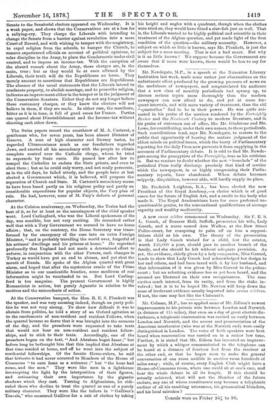At the Conservative banquet, the Hon. R. E. S. Plunkett
was the speaker, and was very amusing indeed, though on party poli- tics he was not very strong. To show how difficult it was to abstain from politics, he told a story of an Oxford agitation as to the emoluments of non-resident and resident Fellows, when the quarrel became so fierce that it was brought into the sermons of the day, and the preachers were requested to take texts that would not bear on non-resident and resident fellow- ships, and to stick to their texts. Accordingly, one of the preachers began on the text, " And Abraham begat Isaac ;" but before long he bethought him that this implied that Abraham at that time resided at home, and off he went into the subject of residential fellowships. Of the fanatio Home-rulers, he said that hitherto it had never occurred to Members of the House of Commons " to earn fame as a nuisance ;" but " the hour had -come, and the men." They were like men in a lighthouse intercepting the light by the interposition of their figures, and estimating their own importance by the gigantic shadows which they cast. Turning to Afghanistan, he ridi- culed those who decline to treat the quarrel as one of a purely military character. They were like the tailors in " Gulliver's Travels," who measured Gulliver for a suit of clothes by taking
his height and angles with a quadrant, though when the clothes were tried on, they would have fitted a star-fish just as well. That is, the Liberals wanted to be highly political and scientific in their treatment of the Afghan question, and yet made light of the first condition of the question—the military necessity. However, a subject on which so little is known, says Mr. Plunkett, is just the subject for a mass meeting. That is not a bad sneer. But why is it so little known ? We suppose because the Government are aware that if more were known, there would be less to say for themselves.


































 Previous page
Previous page